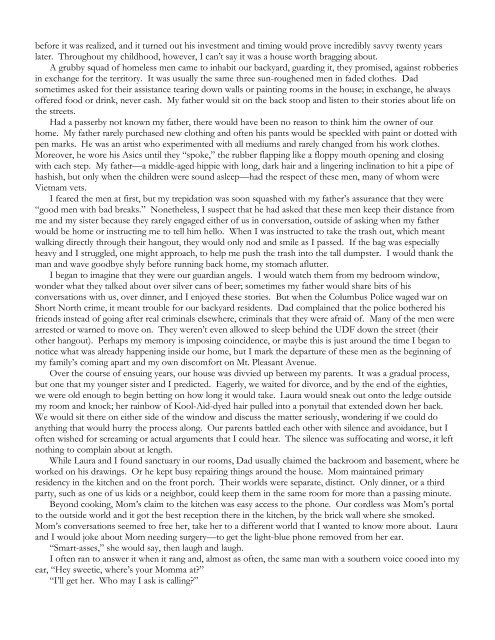Volume Three - WordPress.com — Get a Free Blog Here
Volume Three - WordPress.com — Get a Free Blog Here
Volume Three - WordPress.com — Get a Free Blog Here
You also want an ePaper? Increase the reach of your titles
YUMPU automatically turns print PDFs into web optimized ePapers that Google loves.
efore it was realized, and it turned out his investment and timing would prove incredibly savvy twenty years<br />
later. Throughout my childhood, however, I can’t say it was a house worth bragging about.<br />
A grubby squad of homeless men came to inhabit our backyard, guarding it, they promised, against robberies<br />
in exchange for the territory. It was usually the same three sun-roughened men in faded clothes. Dad<br />
sometimes asked for their assistance tearing down walls or painting rooms in the house; in exchange, he always<br />
offered food or drink, never cash. My father would sit on the back stoop and listen to their stories about life on<br />
the streets.<br />
Had a passerby not known my father, there would have been no reason to think him the owner of our<br />
home. My father rarely purchased new clothing and often his pants would be speckled with paint or dotted with<br />
pen marks. He was an artist who experimented with all mediums and rarely changed from his work clothes.<br />
Moreover, he wore his Asics until they “spoke,” the rubber flapping like a floppy mouth opening and closing<br />
with each step. My father<strong>—</strong>a middle-aged hippie with long, dark hair and a lingering inclination to hit a pipe of<br />
hashish, but only when the children were sound asleep<strong>—</strong>had the respect of these men, many of whom were<br />
Vietnam vets.<br />
I feared the men at first, but my trepidation was soon squashed with my father’s assurance that they were<br />
“good men with bad breaks.” Nonetheless, I suspect that he had asked that these men keep their distance from<br />
me and my sister because they rarely engaged either of us in conversation, outside of asking when my father<br />
would be home or instructing me to tell him hello. When I was instructed to take the trash out, which meant<br />
walking directly through their hangout, they would only nod and smile as I passed. If the bag was especially<br />
heavy and I struggled, one might approach, to help me push the trash into the tall dumpster. I would thank the<br />
man and wave goodbye shyly before running back home, my stomach aflutter.<br />
I began to imagine that they were our guardian angels. I would watch them from my bedroom window,<br />
wonder what they talked about over silver cans of beer; sometimes my father would share bits of his<br />
conversations with us, over dinner, and I enjoyed these stories. But when the Columbus Police waged war on<br />
Short North crime, it meant trouble for our backyard residents. Dad <strong>com</strong>plained that the police bothered his<br />
friends instead of going after real criminals elsewhere, criminals that they were afraid of. Many of the men were<br />
arrested or warned to move on. They weren’t even allowed to sleep behind the UDF down the street (their<br />
other hangout). Perhaps my memory is imposing coincidence, or maybe this is just around the time I began to<br />
notice what was already happening inside our home, but I mark the departure of these men as the beginning of<br />
my family’s <strong>com</strong>ing apart and my own dis<strong>com</strong>fort on Mt. Pleasant Avenue.<br />
Over the course of ensuing years, our house was divvied up between my parents. It was a gradual process,<br />
but one that my younger sister and I predicted. Eagerly, we waited for divorce, and by the end of the eighties,<br />
we were old enough to begin betting on how long it would take. Laura would sneak out onto the ledge outside<br />
my room and knock; her rainbow of Kool-Aid-dyed hair pulled into a ponytail that extended down her back.<br />
We would sit there on either side of the window and discuss the matter seriously, wondering if we could do<br />
anything that would hurry the process along. Our parents battled each other with silence and avoidance, but I<br />
often wished for screaming or actual arguments that I could hear. The silence was suffocating and worse, it left<br />
nothing to <strong>com</strong>plain about at length.<br />
While Laura and I found sanctuary in our rooms, Dad usually claimed the backroom and basement, where he<br />
worked on his drawings. Or he kept busy repairing things around the house. Mom maintained primary<br />
residency in the kitchen and on the front porch. Their worlds were separate, distinct. Only dinner, or a third<br />
party, such as one of us kids or a neighbor, could keep them in the same room for more than a passing minute.<br />
Beyond cooking, Mom’s claim to the kitchen was easy access to the phone. Our cordless was Mom’s portal<br />
to the outside world and it got the best reception there in the kitchen, by the brick wall where she smoked.<br />
Mom’s conversations seemed to free her, take her to a different world that I wanted to know more about. Laura<br />
and I would joke about Mom needing surgery<strong>—</strong>to get the light-blue phone removed from her ear.<br />
“Smart-asses,” she would say, then laugh and laugh.<br />
I often ran to answer it when it rang and, almost as often, the same man with a southern voice cooed into my<br />
ear, “Hey sweetie, where’s your Momma at?”<br />
“I’ll get her. Who may I ask is calling?”







